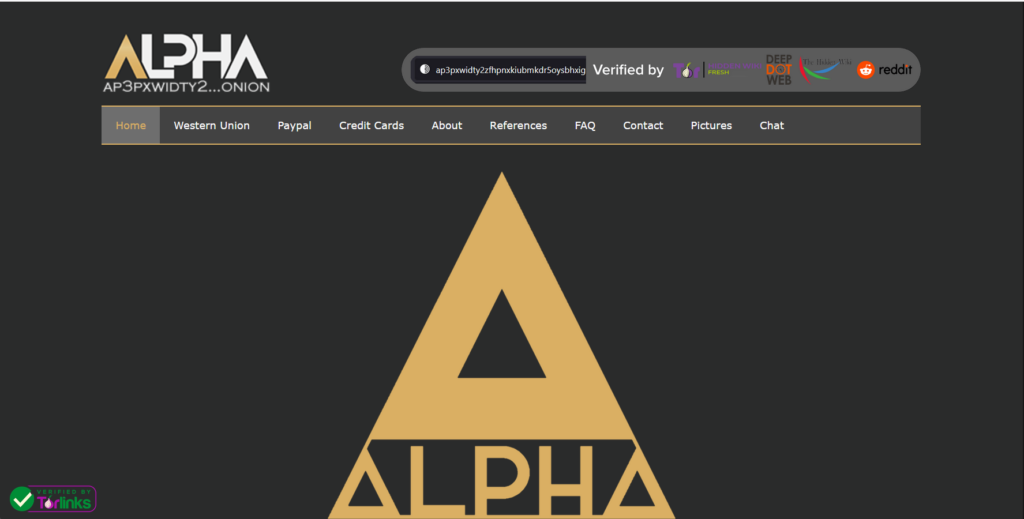Table of Contents
ToggleAlpha Cards – TOR Scam Report (1)
Onion Link: http://ap3pxwidty2zfhpnxkiubmkdr5oysbhxigpt64lqkb7wdmlzuxwdc2id.onion
Scam Report Date: 2023/11/15
Client Scam Report Breakdown
Original Report Summary:
In the original report, the client expressed dissatisfaction with an online transaction, stating, “I deposited the requested amount and nothing happened. Guys do not trust that site, it is a waste of money.” The client was led to believe that after depositing the funds, they would receive a product or service in return. However, after completing the transaction, no delivery or confirmation occurred, leaving the client to conclude that the website is fraudulent. This experience highlights the client’s frustration and serves as a cautionary tale for others to avoid falling into the same trap. The lack of transparency and responsiveness from the site adds to the perception of it being untrustworthy.
Photos:

In the context of online marketplaces, especially on deep web or dark web platforms, incidents like this are common. Scammers exploit the anonymity of these platforms to target unsuspecting users who are either looking for illegal goods or services or simply trying to take advantage of discounted deals. When the client says “I deposited the requested amount,” they are likely referring to the completion of a payment using cryptocurrency, which is the most common form of payment on such sites. Cryptocurrencies like Bitcoin or Monero are often used because of their pseudonymous nature, which makes it difficult to trace the transaction or identify the fraudster once the funds have been transferred.
Analysis of Transaction Flow and Terminology
The term “deposited” in this context refers to the process by which a user transfers funds from their cryptocurrency wallet to a designated address provided by the scam site. When the client mentions that “nothing happened,” it implies that the scam website likely promised an immediate confirmation, delivery, or service once the payment was completed, but failed to deliver on those promises. This is a classic tactic used by fraudulent sites to create a false sense of security, convincing users to part with their funds by showing fabricated reviews or using fake verification systems. The scammer benefits by receiving the cryptocurrency, which is difficult to reclaim due to the decentralized nature of these digital assets.
Additionally, the client’s comment, “Guys do not trust that site, it is a waste of money,” reflects both their disappointment and an attempt to warn future users of the scam. This statement highlights the irreversible nature of cryptocurrency transactions. Unlike traditional payment methods such as credit cards or PayPal, cryptocurrency payments cannot be reversed or disputed once they are confirmed. As such, users who fall victim to scams have little to no recourse unless the scammer chooses to return the funds voluntarily, which is extremely unlikely in these situations. Understanding this distinction is vital for users engaging in transactions on unregulated or underground marketplaces.
Terminology and Scam Prevention Recommendations
In order to better understand this report, it is essential to define a few key terms related to the transaction and the scam. Cryptocurrency wallet refers to a software or hardware tool that stores private and public keys for cryptocurrency transactions. It enables the user to send and receive digital currency and monitor their balance. Pseudonymous means that while the transactions are recorded on a public ledger, the identity of the person making the transaction is not directly tied to their personal information, adding an extra layer of anonymity. These factors make cryptocurrency payments a prime target for scammers who can easily disappear without a trace.
To prevent falling victim to similar scams, users should conduct thorough research before making any transactions, especially on lesser-known or unverified platforms. This includes checking for user reviews from trusted forums, verifying the authenticity of the website, and using escrow services where possible. An escrow service is a neutral third-party service that holds the funds until the buyer confirms that the product or service has been received, thereby protecting both parties from fraud. Lastly, users should be wary of websites that require immediate payments without offering transparent tracking or communication regarding the transaction’s progress.
In conclusion, the client’s report sheds light on the risks of transacting on fraudulent websites, especially in the context of cryptocurrency. By understanding the flow of these transactions and the terminology involved, users can better protect themselves and avoid falling victim to scams that leave them out of pocket with little to no recourse.






